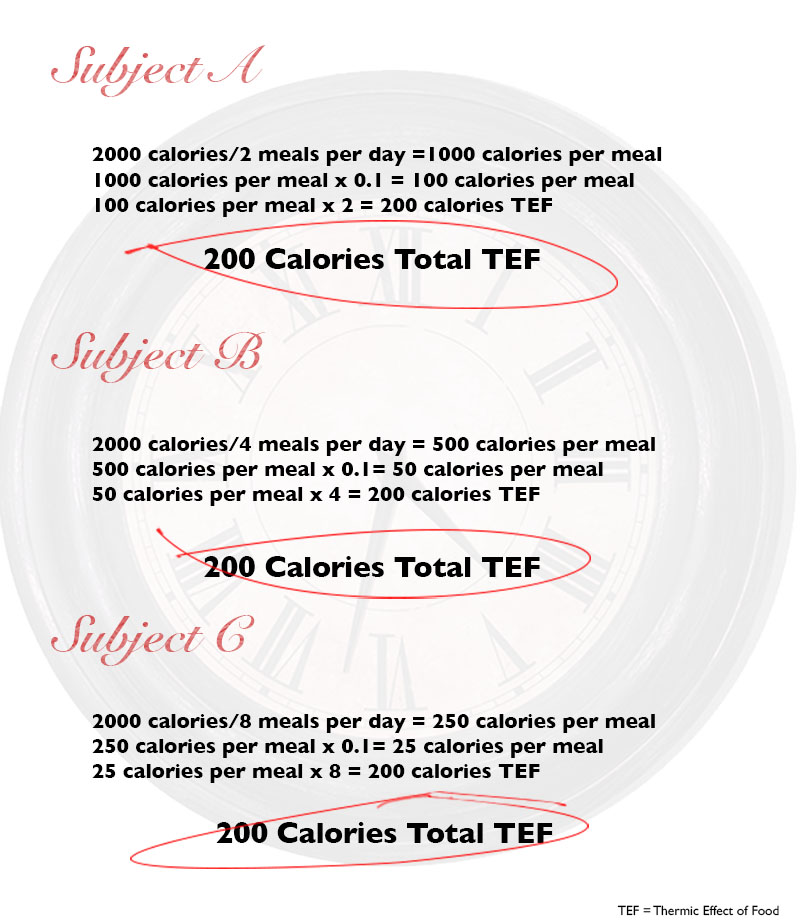
Eating more frequently to aid in weight loss or ‘boost metabolism’ is an extremely popular notion in the health and fitness industry and has been for a long time. It’s actually somewhat irritating to see it pop up again and again considering the sheer volume of good, scientific literature that disproves the theory. To add to that, it’s been talked about at length by some of the best minds in the field (1, 2). All I can really do is present the literature in a way that everyone can comprehend, as the evidence is really somewhat irrefutable. Before I present the evidence, I should say that there is a place for eating more frequently. If you actually like eating more frequently, observe that it keeps your hunger at bay when you're dieting or observe that it increases your appetite when you usually struggle, then continue to eat more frequently. If it fits your interests and improves the quality of your life or training, who am I to say otherwise?
I’m here to debunk the myth that increased meal frequency aids weight loss or ‘boosts metabolism.’ To add to that, there definitely is a place for increased meal frequency for bodybuilders or anyone dieting to low levels of body fat, as outlined in Eric Helms and Alan Aragon’s evidence based recommendations for natural bodybuilding preparation (3). Where did this idea come from? The premise comes from the misunderstanding of something called the thermic effect of food. To calculate total energy expenditure, sources quote four different components to the equation (4):
- Basal metabolic rate (energy needed to sustain the body’s most basic functions)
- Thermic effect of activity
- Thermic effect of food
- Adaptive component of energy expenditure
For the purposes of this article, we are interested in the Thermic Effect of Food (TEF). This is defined as the calories your body uses or ‘burns’ to digest and absorb the nutrients we eat (4). It is somewhat reasonable to say that eating boosts metabolic rate as energy is required to digest and absorb food, but then people misinterpret this and assume that stimulating the TEF more often causes a proportionately increased metabolic rate. This is fundamentally incorrect. Assuming calories are equal, you will expend the same number of calories a day from the TEF regardless of your meal frequency. The TEF is estimated to be around 10 percent of caloric intake in a mixed diet (5), so let’s take three people who consume isocaloric diets and eat balanced macronutrient ratios. (It's true that protein requires more calories to digest and absorb than carbohydrates and fats.)
The take home message is increasing meal frequency does not increase the TEF. Increasing caloric content increases the TEF. I repeat, increasing meal frequency does not increase the TEF. Increasing caloric content increases the TEF. Thank you. Perhaps the best piece of literature on this topic is a review article from the British Journal of Nutrition in 1997 (6). They concluded that: “There is no evidence that weight loss on hypoenergetic regimens is altered by meal frequency.” They stated that earlier studies that show weight gain and weight loss due to the alteration of meal frequency can be attributed to confounding factors such as appetite and macronutrient content of food and are not a direct effect of metabolic rate. Some studies show that lower meal frequency is correlated with higher body weight. This is used to defend the stance that higher meal frequency is beneficial for lower BMI. To add to this, there are observational studies that correlate skipping breakfast with a higher BMI (7).
To my understanding, these are merely observational studies and actually don’t really have any application to our topic of discussion today. We must also consider cause and effect. Are these people skipping breakfast because they are already overweight and are trying to lose weight? I will point again toward the British Journal of Nutrition’s review article (6): "We conclude that the epidemiological evidence is at best very weak and almost certainly represents an artefact." Here is another study to strengthen my argument: "Increased meal frequency does not promote greater weight loss in subjects who were prescribed an 8-week equi-energetic energy-restricted diet" (8). This study shows there wasn't any difference in weight loss between subjects with high/low meal frequencies. “We concluded that increasing MF does not promote greater body weight loss under the conditions described in the present study.” With the help of science, the notion of eating more frequently to boost metabolism and thus aid in weight loss has been systematically debunked and put to bed. Hope you enjoyed reading!
References
- Aragon Alan. A critique of the ISSN position stand on meal frequency. At: http://www.leangains.com/2011/04/critique-of-issn-position-stand-on-meal.htm.
- Meal frequency and energy balance. At: http://www.bodyrecomposition.com/research-review/meal-frequency-and-energy-balance-research-review.html. Last accessed: Oct. 14, 2014.
- Helm Eric R, Aragon Alan A, Fitschen Peter J (2014) Evidence-based recommendations for natural bodybuilding contest preparation: nutrition and supplementation.
- Volp AC Pinherio, et al (2011) Energy expenditure: Components and evaluation methods. Nutr Hosp. At: http://scielo.isciii.es/pdf/nh/v26n3/02_revision_02.pdf.
- Obesity Assessment: Tools, Methods, Interpretations (A Reference Case: The RENO Diet-Heart Study), page 196.
- Bellisle F, et al (1997) Meal frequency and energy balance. Br J Nutr 77(S1):S57–70.
- Tin SP, et al (2011) Breakfast skipping and change in body mass index in young children. Int J Obes (Lond) 35(7):899–906.
- Cameron JD, et al (2010). At: http://www.ncbi.nlm.nih.gov/pubmed/19943985.










It was my understanding that the point of changing MF was to stay ahead of #4 - Adaptive component of energy expenditure. For example, one theory behind Intermittent Fasting is that it forces the body into lipolysis once intra-cellular glycogen stores are depleted. Conversely, a high meal frequency will prevent catabolism that might accompany a drop in free glucose (assuming already in a state of good insulin sensitivity.)
I am not saying your end argument is wrong (high meal frequency is better for weight loss). High meal frequency was really popularized by the golden era bodybuilding community, but some may have been supplementing with synthetic insulin and other drugs. But I would recommend at least addressing your #4. I'd be very interested to read your review.
Excuse my ignorance but I'm not quite sure what your question is? My end argument was that increased meal frequency was not better for weight loss.
I agree that increased meal frequency may prevent catabolism, and that fasting forces the body into lipolysis if one is in a state of negative energy balance.
Regards,
James